The Guitar Interview: Lamb Of God on charting their own path and creating their brutal new record
We sit down with metal aristocrats Willie Adler and Mark Morton to talk tone, technique, building chicken coops, and addressing the deeper issues of society in their new self-titled album.

Image: Eleanor Jane
In the face of global upheaval, few genres of music are better equipped to respond than metal. Lyrics illustrating the “rotting corpse of democracy” or “trickle-down narcotic doom” are less common in, say, country and western, although maybe that’s music’s loss. In any case, Lamb Of God’s latest self-titled record is a cathartic exploration of the state of things, driven by the explosive playing of guitarists Mark Morton and Willie Adler.
Like 2020, Lamb Of God doesn’t open with a full-on onslaught. Instead, it draws you in with a false sense of security. The music and whispered vocals remain awash with reverb, atmospheric and melodic, until suddenly a scream of “wake up!” prompts Adler and Morton to catapult us into familiar groove metal territory. Their first album of new music in half a decade Lamb Of God shows off the kind of connection two guitarists build by playing together at a break-neck pace for the better part of 20 years.
A depression fed by overload
Being the band’s first record in five years, the album has a lot to address. The change in global politics, how we relate to what’s going on in the world at large and the apathy of those in charge all come under scrutiny across the LP. But Morton, who collaborated with vocalist Randy Blythe on Lamb Of God’s lyrics, sees it as “addressing a much deeper issue than just one particular administration, or even one particular country. There are references, of course, to what’s happening specifically here in the US. But the concepts we’re talking about predate any particular president. They’re observations of what we’re doing as a civilisation – it’s not about railing against the president, it’s about observing how things have changed what role we have. And what responsibility we have in redirecting it.”
The scream of “wake up!” that kicks off Memento Mori doesn’t just make it a great alarm-clock song, it tells us the “depression fed by overload” it describes isn’t inescapable. When we ask Mark Morton if he has any tips for staying hopeful through the current global chaos, he laughs and says “I mean, you can turn the fucking TV off and unplug your computer, let your phone drain out of battery! That obviously doesn’t make the problem go away. But it sure does change your perspective.”
He’d previously mentioned that he had been out building a coop for his chickens, and we ask if that was in any way related. He responds dryly: “I have been building a chicken coop because we have chickens and they need a new home,” which we can’t really argue with. “But that’s a perfect example, Go out, dig in the dirt. I’m not preaching, I have been sucked into all this negativity and drama as much as anybody. More, in some cases. But I’m finding lately if I get outside and I move around, go for a walk or break a sweat, build some things around the house, get some sun on me and my hands in the dirt – I’m just a happier human being.”
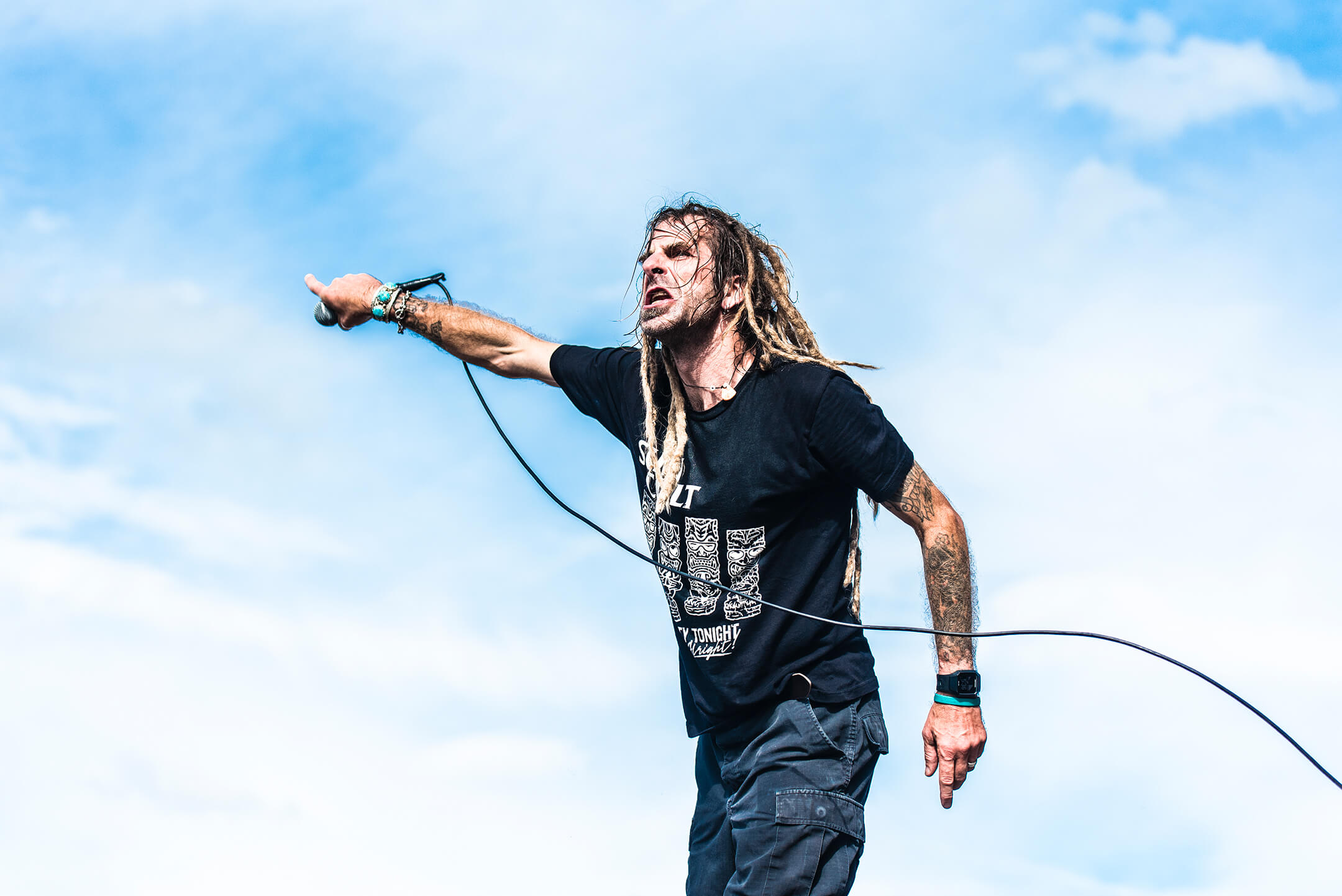
Willie, however, has fallen off his habit of home-roasting coffee beans. “And I miss it,” he says. “But I’m still a huge coffee snob. I definitely am. It’s kind of bumming me out, because there’s nothing like pulling a couple of espresso shots from beans that I roasted the day before. That shit’s unbelievably good.”
“The concepts we’re talking about predate any particular president. They’re observations of what we’re doing as a civilisation ”
Right-hand path
Musically, the record shows off two distinct playing styles, with Adler’s unusual right-hand technique setting him apart from his shredding peers. Rather than his fingers arcing out across the strings, Adler’s wrist is straight as an arrow, with his little finger gathering his hand into a point that’s aimed, most of the time, at the base of the guitar’s neck. This grew out of his self-taught approach, emulating the sounds he heard on early thrash metal. As he puts it, “I don’t think anybody would teach me to play that way! It’s just the way I taught myself. My mom had me playing piano from a very early age, and then I picked up guitar around age 11, and I just gravitated towards the instrument – but never took any lessons.”
“When I first picked up a guitar I wanted to be able to create the same sounds that I was hearing on the records that I liked. And in chasing that, I think I developed my style of playing. It’s not anything I have a name for, or you know, that I consciously think about while I’m playing, it’s just how I formed as a guitar player.”
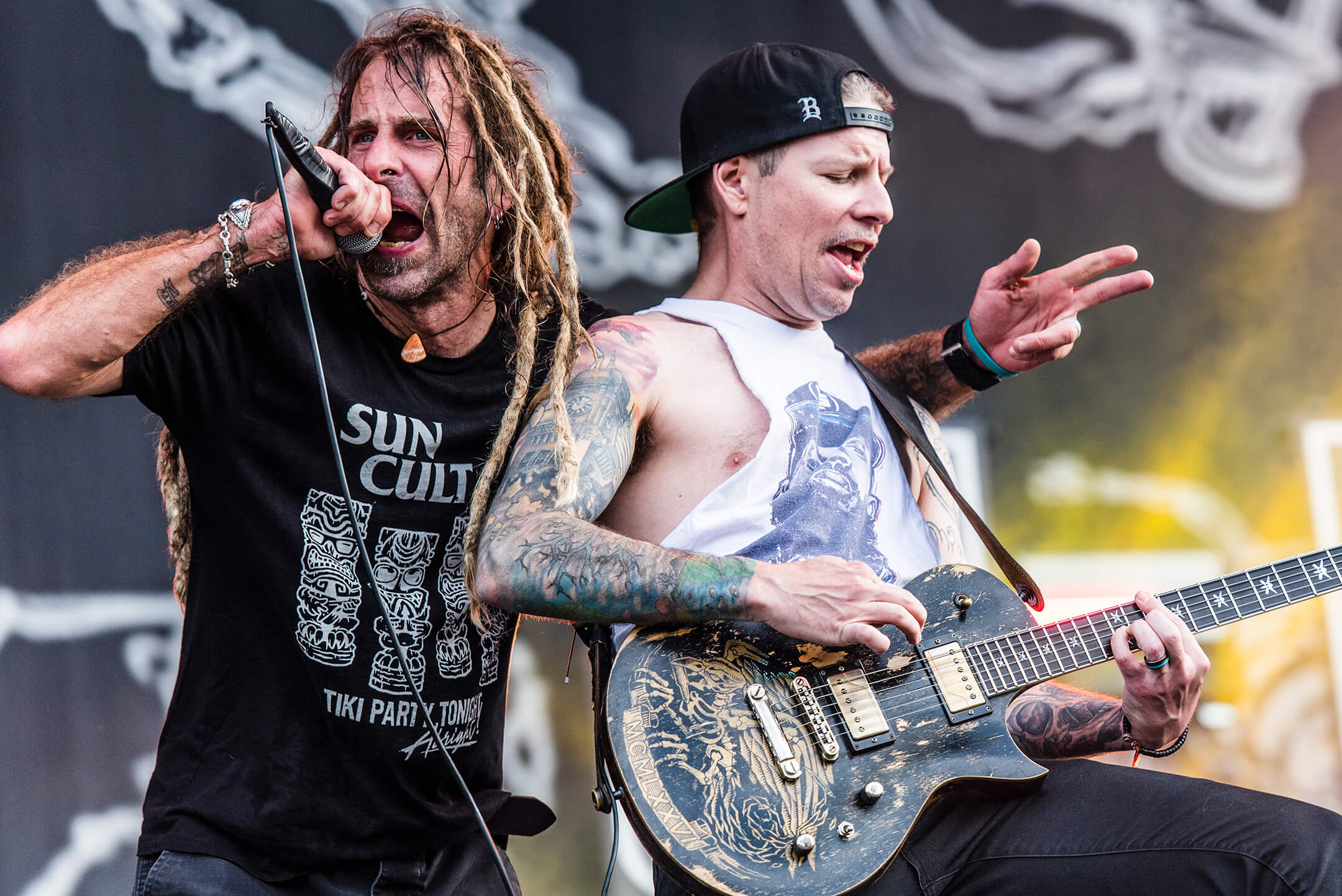
Evidently the approach worked, as he’s so precise with his playing Mark Morton can see the difference in the waveforms of their guitar takes: “Willie plays so on top of the beat, he’s almost in front of it,” Mark says. “When you start taking the right and left WAV files of the takes, you can see, basically, on a grid, how Willie is dead on top of the quarter note and I’m just slightly behind. It’s just a different pocket, a different perception of the rhythm.”
This difference in beat feel is definitely part of the reason their playing works so well together. It doesn’t all need to be about robotic precision for Morton: “Some drummers are so deadly on the beat they sound quantised without actually being quantised, and that’s cool and all – but then I’ve played with guys that have a real lope, and to me that’s great. The fact that someone has that pulse built into their playing.”
Even in the speedy and precise world of metal, there’s room for personality to shine through, and to him, “That’s kinda the beauty of music. That you and I can sit down and play the same riff from the same tab, but we’re gonna play it differently because we have a different pulse and we’re different humans. That’s why the guitar is so cool, everybody has their own interpretation of it, their own style that’s inherent and natural to them.”

Willie acknowledges he sometimes gets wrapped up in the laser-precision of his playing, even if he doesn’t inspect audio files with the same scrutiny as his co-guitarist: “That’s a keen eye on Mark! I’ve never looked at the actual waveforms of my tracks, but it is something I’ve been working on. I get too caught up in the details. Sometimes that’s great, but as I’ve gotten older and more mature I’ve managed to pull myself back a bit, but Mark’s right. I am a perfectionist in that way – I lose focus on everything but the detail.”
Morton’s own interpretation tends towards one rooted in rock and blues tradition. While he’s by no means sloppy, he remains ever so slightly towards the back of the beat: “Willie is a very acrobatic player, he’s got a very kind of rolling, finesse-y right hand and incredibly unconventional note choices and abstract approach with his left hand and wrist in general. I think I’m a conventionally rock-rooted player, the guys I grew up listening to are different to the ones Willie did – he was kind of a metal purist. Whereas I’m more of a Stones/Zeppelin kind of guy. The roots of my playing and my experience with music isn’t that sort of stuff. So I’m kind of more blues-oriented and probably a little more ham-fisted. I hit harder.”
NWOAHM
“Metal purist” is perhaps putting in strongly, as Adler had an affinity for a broad spectrum of heavy music growing up: “When Kill ’Em All came out I had that on tape, I had the first Corrosion of Conformity album on tape, I had all the Sex Pistols vinyl,” he says, “As well as a bunch of hardcore, you know, bands like Agnostic Front, Sheer Terror, 7 Seconds, Shelter, and while all those dudes are super punk-rock and not really precise, the technical aspect of the early Metallica records is what I really wanted to emulate, I wanted to play that clean and tight.”
But as he’s gotten older that net has widened even further, encompassing more than just metal and hardcore: “There are so many guitar players that have influenced me over the years, from Kirk and James to Nick Drake and Leo Kottke – dudes who are completely out of the metal world entirely.”

As for who Adler’s listening to right now, he admits he’s gravitated more towards non-metal genres. “It’s odd to say. As far as what other guitar players are doing, I think I’m just not interested. That’s not a slight on them, I mean there’s a lot of great players out there – there’s probably some 14-year-old kid who can play circles around me, I’m sure there is. But I just like to do what I do.”
Mark has also shown us his non-metal side over the years, first releasing his eclectic solo album Anesthetic, and more recently his solo EP Ether. Ether especially is far more acoustic than Mark’s approach in Lamb Of God. It came as a result of his first brush with stage nerves in a while: “I played some acoustic shows, and I loved how nervous I was about doing that. It’s not often I get anxious playing a show, but to play in front of 150 people with an acoustic guitar made me nervous. I liked that. So I had the idea of the Ether EP, which isn’t entirely acoustic but it’s rooted in that.”
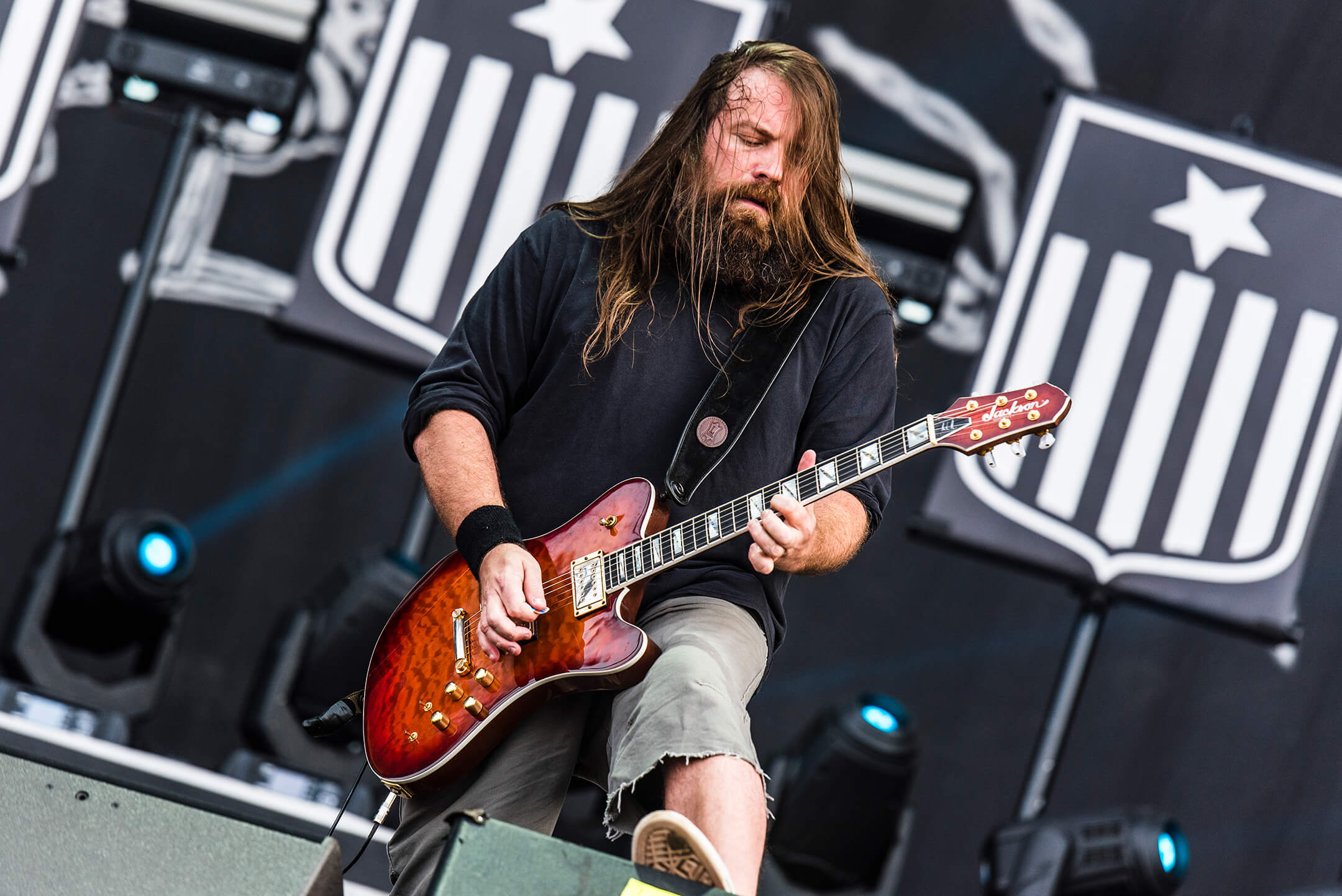
The EP was “its own thing,” according to Morton, “Different to Anesthetic, which I had written over the course of several years. The EP was honestly conceived, written, recorded and released in a matter of four or five months. So I was really writing quickly and deliberately for that project.”
But as for introducing those elements into Lamb Of God, Mark doesn’t see it happening. “There wasn’t really much overlap,” he says. “There were a couple of songs on Anesthetic which could have been Lamb Of God riffs had I forced them a bit, but they were done at the suggestion of the producer, who said ‘listen, your fans are gonna want some metal’ I was more than happy just to make a rock record, but we put some of the more metal songs on there which ended up being the right choice.”
“there’s probably some 14-year-old kid who can play circles around me, I’m sure there is. But I just like to do what I do.”
Tonal consistency
When it came to choosing the right tools for the job on Lamb Of God, it didn’t take long, as both Willie and Mark primarily plugged their signature guitars – Adler’s ESP Warbird and Morton’s Jackson Dominion models respectively – into gunned Mesa Boogie Mk IV and MK V heads.
Constructing the record wasn’t based around stacking the tones of myriad different amps and drive pedals, however, as Morton explains: “I think things just track cleaner like that. You get a broader spectrum of frequencies. When you start layering signals and stacking stuff up, it just starts mushing out.” And, perhaps counterintuitively for metal, it’s important to “turn the gain down a little bit. Getting by with as little gain as you can when you’re tracking –it just allows for a clearer sound.”
Morton’s straightforward approach also applies to gear as well as gain: “I’m such a nut for consistency, he admits, “so I don’t really like to change too much about my gear. My live signal path always stays the same. But maybe every once in a while I’ll use something new. In the studio, we have this milk-crate full of pedals, we try some, we turn the knobs, we think it sounds cool, and then we might track with it.”
Instead, most of the effects were achieved in-the-box thanks to long-time producer Josh Wilbur, whose first outing with the band was 2009’s Wrath. He’s worked the desk since, but this time Wilbur was also instrumental in the writing of the album, sitting in on the initial riff-honing sessions. “We wrote it very differently than we had in the past,” says Willie Adler. “Mark, myself and Josh did three different writing sessions that were separated by months. So we would get together and go over material that we’d all combined in our time off touring, and then we’d take a break for a couple of months and come back, allowing for much more focused writing sessions.
“The way that it developed was very organic, free and relaxed. And very purposeful. When we finally had this collection of songs, each song was its own thing, and collectively they were this concise collection of music. And due to all that, it struck us all that this was a very special record. Not because of any one song, but as a whole, it’s incredibly special.”
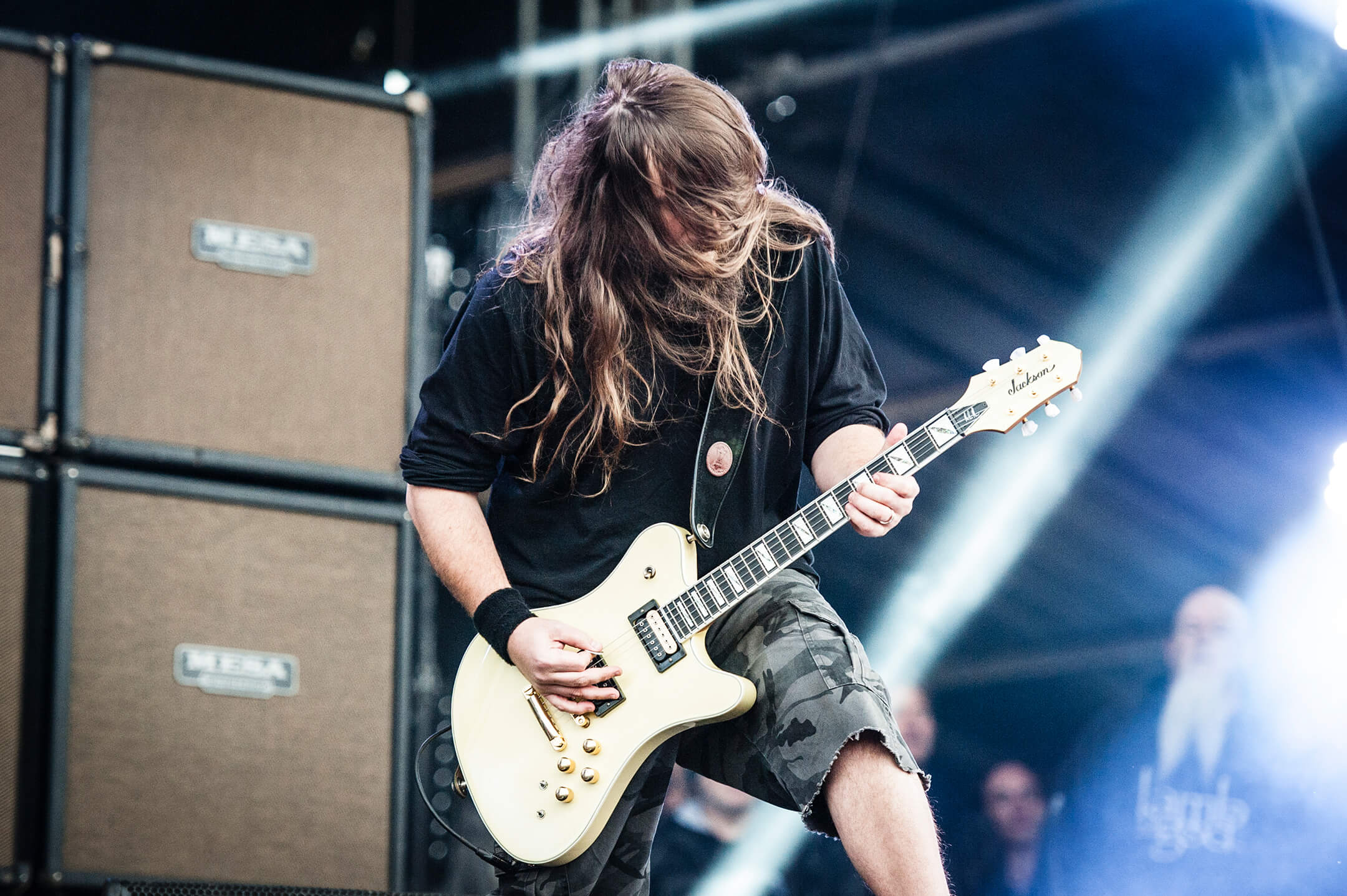
These writing sessions, in between legs supporting fellow metal giants Slayer, created a genuinely collaborative writing environment – going back to how they approached things in the beginning. “The first couple of albums, we would all be in a room throwing riffs back and forth,” says Morton. “You can hear that in the songs, they don’t have the same type of structure that more recent songs do. And then as we progressed, it became more common we’d each bring songs in – we never set a rule, that just happened naturally. But for the last couple of albums, Willie and I have been going, kind of deliberately, back to the process of: ‘Let’s not just sit and craft our own songs and pitch them for the album. Let’s get a verse and a chorus and really bounce them off each other, just volley the ideas back and forth.’”
The new abnormal
While there’s been some talk of creative burnout during lockdown, that’s not the case for Mark or Willie. “All I’ve been doing is writing music, playing guitar, and all kinds of creative endeavours,” says Adler. “It’s one of those things – I never really stop writing music, so this is… kinda right up my alley. I just hole myself up in my little studio and just go to town.”
Morton concurs with this approach. “I’ve been writing like crazy,” he says, “metal songs, rock songs, some might be solo material, some is for other people. So there’s some of that stuff coming together. It’s all over the place but I’ve been writing.”
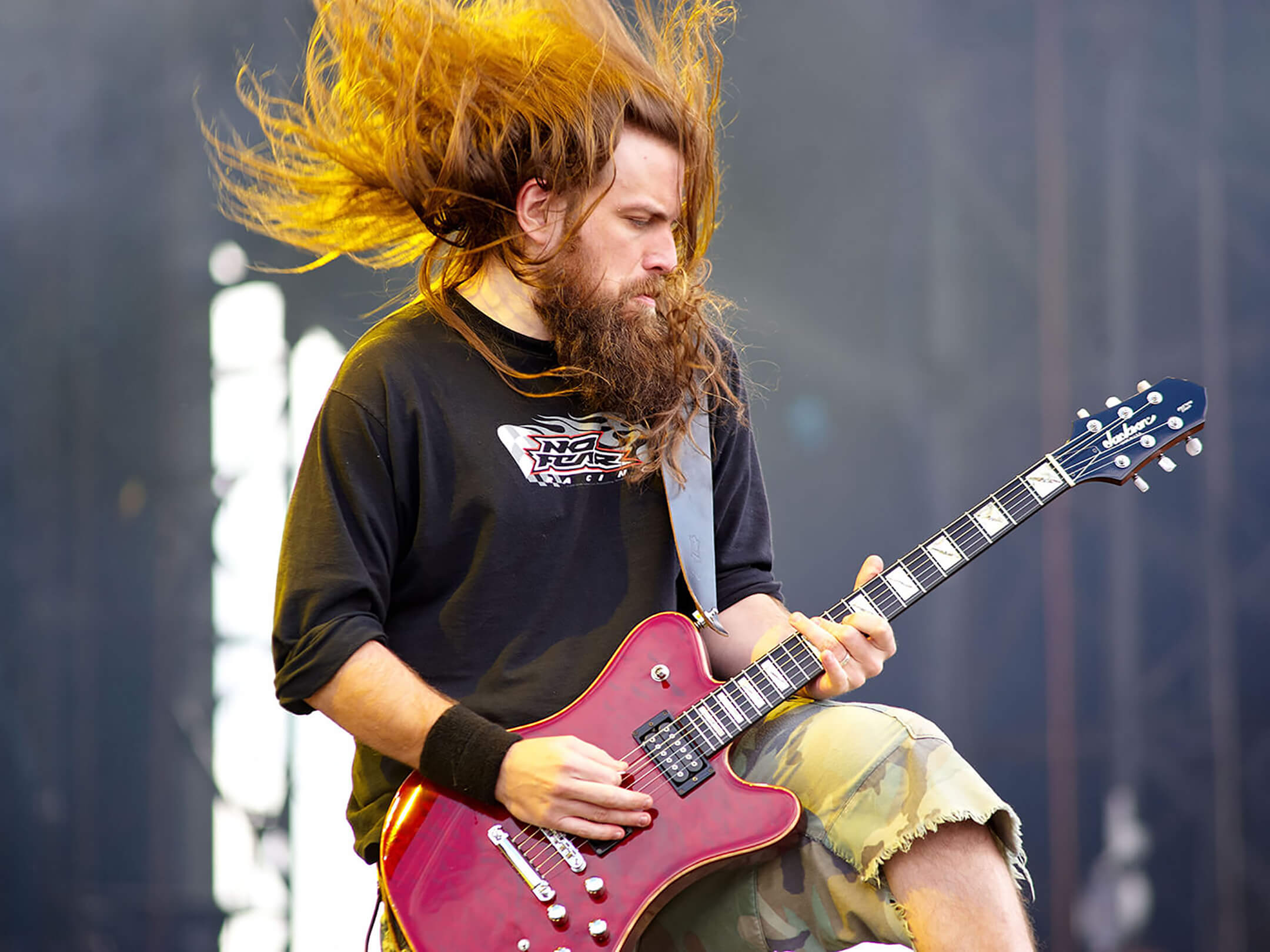
Mark’s not immune to writer’s block, however. “Sometimes you just put it down, for whatever reason it’s just not happening. When I say I write all the time, it doesn’t mean that every day for hours every day writing – when it comes, it comes. And sometimes it comes at an inopportune time when I might have something else I need to get done, but then I have to start the process of it becoming real, documenting it somehow.”
When it comes to looking past the current quarantine situation, one thing is at the top of the list of priorities. “I want us to be able to support this record!” Willie exclaims. “And do what we set out to do while we were writing it. The last record we didn’t really support it as well as we could have – and the timing on all of this is making me think, ‘holy fuck, here we go again, one of the best records that we’ve ever done, and we can’t even tour on it.’”
While both Mark and Willie have enjoyed the time spent being creative, Adler notes: “I love just sitting here and writing riffs and putting music together, but the live experience is crucial. And, even more so in the financial aspect. For the genre of metal it’s incredibly crucial. Music is such an integral part of people’s lives, that we have to return to some semblance of normalcy at some point. After all this, people will have a deeper appreciation for the moments in life that we are all able to get together and celebrate like that. I can’t imagine a world where that’s not the case.”
Lamb Of God is out now on Napalm Records.
